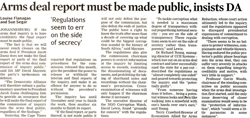|
Getting your Trinity Audio player ready...
|
 If the arms deal inquiry is to have credibility the final report must be made public. "The fact is that we will never reach closure on the arms deal if President Jacob Zuma does not make the final report or parts of the final report of the arms deal commission of inquiry public," said DA MP David Maynier, the party's spokesman on defence.
If the arms deal inquiry is to have credibility the final report must be made public. "The fact is that we will never reach closure on the arms deal if President Jacob Zuma does not make the final report or parts of the final report of the arms deal commission of inquiry public," said DA MP David Maynier, the party's spokesman on defence.
"The Democratic Alliance will therefore submit a parliamentary question to President Jacob Zuma challenging him to provide an assurance that he will make the final report of the commission of inquiry into the arms deal public, regardless of the findings." Yesterday, the Cape Times 'Regulations seem to err on the side of secrecy' reported that regulations on procedures for the commission, released this month, give the president the power to release or withhold the interim and fmal reports of the inquiry, and make it an offence for anyone to do so without the president's permission.
The inquiry has until November next year to finish the work, then another six months to fmish its report. "If the final report, or parts thereof, is not made public it will not only defeat the purpose of the commission, but also defeat the ends of justice. The public have a right to know the truth after more than a decade of covering up what could be the biggest corruption scandal in the history of South Africa," said Maynier.
The regulations also give the commission chairman powers to restrict information at the inquiry by limiting access to records, restricting the disseminating of documents, and prohibiting the taking of shorthand notes and recordings without the chairman's permission. Crossexamination of witnesses will only happen if the chairman deems it necessary. The executive director of the NGO Corruption Watch, David Lewis, found "grounds for concern" with the regulations. "To tackle corruption what is needed is a maximum degree of transparency without jeopardising national security – you err on the side of transparency.
These regulations seem to err on the side of secrecy rather than transparency" said Lewis. Dr Richard Young, managing director of CCII Systems – which lost out on an arms deal contract and later successfully sued the state for a pay-out – described the regulations as "almost completely one-sided" and geared towards protecting the inquiry and the "potentially guilty". "From someone having done it before… being a potential witness looks and feels like walking into a minefield with one's hands over one's ears," said Young. Terry Crawford-Browne of Economists Allied for Arms Reduction, whose court action ultimately led to the inquiry, said the regulations appeared to disregard presidential expressions of commitment to dealing with corruption. "There seems to be no balance to protect witnesses, complainants and whistle-blowers.
Having endured the public protector's public phase hearings into the arms deal, they can suffer very severely in attacks on them regarding integrity credibility and motive, with very little in support." Professor Gavin Woods, chairman of the standing committee on public accounts when the arms deal investigation first started, said the only issue deserving of closer examination would seem to be the "protection of information", which "could seem a little paranoiac in some instances".
This article originally appeared in the Cape Times on 22 February 2012

To tackle corruption what is needed is a maximum degree of transparency without jeopardising national security – you err on the side of transparency, Corruption Watch’s David Lewis said in the Cape Times.



